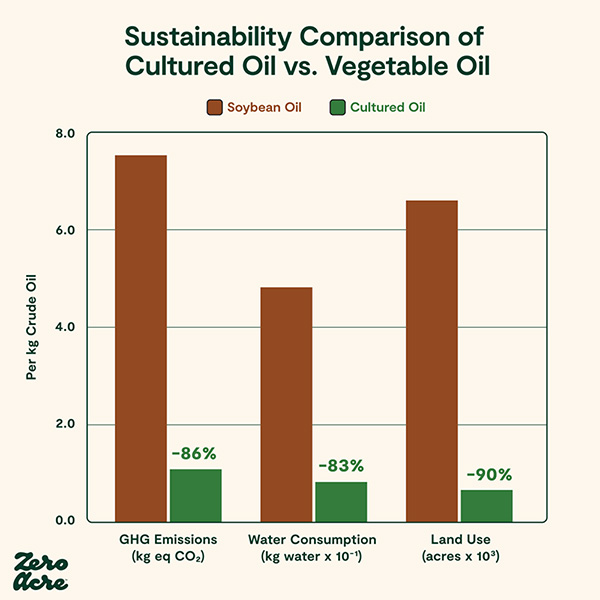
The plants grown to satisfy global demand for cooking oils–including soybean, palm, sunflower, peanut, avocado, coconut, canola, and olive–now comprise nearly 25% of the world’s cropland. The planting and harvesting of these crops are significant contributors to the deforestation of old-growth forests, producing substantial carbon emissions. Zero Acre Farms, A California-based startup, is hoping to change that by fermenting sugarcane with microorganisms from algae in order to convert the sugar into oil.
- Vegetable oils are leading drivers of deforestation, land use, water consumption, and biodiversity loss.
- Compared to the most prevalent vegetable oil in the U.S. (soybean oil), Zero Acre oil emits 86% fewer greenhouse gases, consumes 83% less water, and uses 90% less land.
- If just 5% of vegetable oil in the United States were replaced with Zero Acre oil, it would save 3.1 million acres of land — about the size of Connecticut! When used in place of olive oil, every 16-oz bottle of Zero Acre oil saves 222 square feet of land.
- Zero Acre oil requires 88% less water than palm oil, 90% less water than sunflower oil, and 300 times less water than olive oil. Using one 16-oz bottle of Zero Acre oil instead of the same amount of olive oil saves 5,000 cups of water.
- Zero Acre oil comes in a 100% recyclable BPA-free aluminium bottle, offering a more sustainable option than plastic or glass
Good News
- Lhasa’s afforestation brings happiness to residents, supports carbon reduction and sequestration.
- Heat pump grant increased to £7,500 by government in efforts to lower pollution and bills. Heat pumps emit far less pollution than gas boilers and can lower bills, but are expensive upfront. The government hopes the scheme will bring the cost of installing a new heat pump in line with that of a gas boiler
- Climate change: Kenya’s power sector is a shining example, the big hurdles are household and transport emissions
- Surging renewable energy sees record supply to Australia’s electricity grid. At one point in September nearly 100% of eastern Australia’s demand could have been met by renewables, says energy operator Aemo
- Meet the climate crisis speed-daters: ‘If you don’t love the planet, you won’t be my boo’. Young New Yorkers ready to ‘find love and save the planet’ connect in matchmaking video series
- Solar power expected to dominate electricity generation by 2050 – even without more ambitious climate policies
Not so Good News
- Storm Babet caused dangerous floods as the ‘dry side’ of Scotland isn’t used to such torrential rain
- UK must offer businesses certainty over green energy, says boss of FTSE 100 firm. Miles Roberts of packaging-maker DS Smith warns manufacturing will decline unless government provides clarity about decarbonisation
- World shift to clean energy is unstoppable, IEA report says. The world is on an “unstoppable” shift towards renewable energy but the phase down of fossil fuels is not happening quickly enough, a new report says.
- £1bn fund to expand EV charging network still not open after three years. Rishi Sunak unveiled funding pot for expanding charging facilities at motorway services in 2020 but it is not yet accepting bids
- How climate change is affecting the seasons
- Shell cuts 200 jobs, contracting the hydrogen division. The hydrogen wing of the oil and gas giant is to shrink as the company moves away from work on powering hydrogen cars.
- Definitions changing in UK’s bid to meet climate finance target. Andrew Mitchell, the development minister, said ‘clarifications’ would more accurately reflect spending
- Investigation launched into ‘greenwashing’ in gas industry. Competition regulator’s probe comes after openDemocracy found sales advisers were making false claims about boilers.
- Electrifying offshore platforms targets a tiny fraction of the oil industry’s emissions
- UK regulator trying to block release of Shell North Sea documents. Exclusive: North Sea Transition Authority under fire for using lawyers to argue against publication of environmental impact
- Stop locking young people out of legal process in climate cases, say experts. Children are particularly vulnerable to climate crisis yet have little say politically or legally in most of world
Bad News
- Children at ‘existential risk’ from climate crisis, UK’s top paediatrician says. Exclusive: Physical and mental impact on young people needs immediate action, Dr Camilla Kingdon says
- Earth’s ‘vital signs’ worse than at any time in human history, scientists warn | Climate crisis | The Guardian. Life on planet is in peril, say climate experts, as they call for a rapid and just transition to a sustainable future.
- Increasing melting of West Antarctic ice shelves may be unavoidable – new research
- World shift to clean energy is unstoppable, IEA report says
- Rapid ice melt in west Antarctica now inevitable, research shows. Sea level will be driven up no matter how much carbon emissions are cut, putting coastal cities in danger
- Himalayan communities are under siege from landslides – and climate change is worsening the crisis. Twenty people were killed when a temple in Shimla, northern India, collapsed under a landslide in August 2023
- World far off track on pledges to end deforestation by 2030 – report
- EU must cut carbon emissions three times faster to meet targets, report says. Climate commissioner says the pace of reductions needs to speed up in buildings, transport and agriculture to meet the 55% target by 2030.
- We studied more than 1,500 coastal ecosystems – they will drown if we let the world warm above 2°C
- Young crown-of-thorns starfish can survive heatwaves. That’s yet more bad news for the Great Barrier Reef
- ‘Carbon mega bomb’: climate experts urge Biden to block gas export hub. Despite pressure from environmentalists to halt Louisiana construction, the US president touts gas exports to Europe
- ‘Ukraine is a false justification’: America’s destructive new rush for natural gas. As the war in Ukraine sent natural gas prices skyrocketing, liquid natural gas (LNG) plants are springing up all along the fragile Gulf Coast – seriously harming not just local communities but the world’s ability to keep the entire climate crisis at bay
- Earth close to ‘risk tipping points’ that will damage our ability to deal with climate crisis, warns UN. Analysis also warns of further tipping points on horizon such as drying up of groundwater vital for food supplies
Upcoming Events

Book for free here through Eventbrite Stockport’s 3rd Climate Action Now Summit.
Other Media News
BBC Sounds – Poet Laureate in the Arctic – Available Episodes. Simon Armitage is in the Arctic, to see for himself what’s happening in a part of the world that’s so crucial to the climate change debate, and to write new poems in response.
The latest excellent (10 min) video from ‘Just Have a Think’ is This energy storage technology is HOT STUFF! It is basically about a very sustainable way of storing energy. Rondo Energy just secured $60 million of funding from some of the world’s shrewdest investors. So, can they now achieve their goal of a 90GWh per annum production facility for their simple heat battery technology, reducing global industrial CO2 emissions by 12 MILLION tonnes per year? Time will tell!

